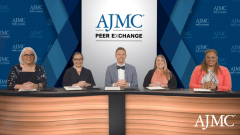
Updates in MS Clinical Trials
A discussion surrounding clinical trials in multiple sclerosis is led by Dr Haumschild.
Episodes in this series

Ryan Haumschild, PharmD, MS, MBA: Dr Hickman, evobrutinib is currently being studied in 2 phase 3 clinical trials, both evolutionRMS 1 [NCT04338022] and [evolutionRMS] 2 [NCT04338061]. Based on the encouraging results of the phase 2 trial in patients with relapsing multiple sclerosis [MS], what are your impressions from the data of the phase 2 trial? And then even further between trial 1 and trial 2, what are your thoughts on teriflunomide [Aubagio] being the active comparator? How does that actually play out?
Amanda Hickman, PharmD, MPH, MSCS: Absolutely.
Ryan Haumschild, PharmD, MS, MBA: Maybe characterize those studies for us and our viewing audience.
Amanda Hickman, PharmD, MPH, MSCS: Absolutely. So the phase 2 trial, just kind of summarizing that a little bit, these patients, it was placebo-controlled, randomized, blinded. They were on a potential of 3 doses for evobrutinib. There was a placebo, and then it was compared to the normal dosing for dimethyl fumarate. Their primary outcome was how many gadolinium-enhancing lesions were there at 24 weeks. So, 6 months. And it did meet its primary objective. The new gadolinium-enhancing lesions in the trial arms were about 50% of what the placebo had, so it did reduce the amount of lesions in MRI activity that was found. A few of the other secondary outcomes didn’t meet statistical significance with those, and, honestly, I think it’s because it was a short time frame. A lot of stuff was looking at the change in disability, looking at the annualized relapse rate. I don’t think that’s enough time to really get a good number on that. So that’s what I’m excited to look at the other 2 phase 3 trials, because they are much more longer term. We’re looking at 3 years of following patients. And then there’s going to be extended trials as well, so we’ll be really able to get those. That primary outcome is for annualized relapse rate. But what I’m also excited about, going back to our conversation, is the secondary objectives or outcomes are basically quality of life based. So disability and they’re not just looking at mobility, they’re looking at fatigue, they’re looking at cognition.They want to expand into those other areas that really impact patients with MS, beyond just, are they able to get from point A to point B?
Mitzi Joi Williams, MD, FAAN: I’m also very interested in the comparison to teriflunomide. Although in many of our algorithms, it may be considered not one of our highly efficacious therapies, it has performed extremely well in disability measures.
Amanda Hickman, PharmD, MPH, MSCS: Absolutely.
Mitzi Joi Williams, MD, FAAN: Some of our top therapies have not been able to beat it, in terms of having a statistically significant difference in disability progression. I’ll be very interested to see how the BTKis [Bruton tyrosine kinase inhibitors] perform vs teriflunomide in measuring long-term disability.
Amanda Hickman, PharmD, MPH, MSCS: Absolutely. And I think it could be, again, touching back to the mechanisms of things teriflunomide, I usually tell patients, it basically just calms your immune system down a little bit, makes it not so active and not so aggressive. The BTK inhibitors really shine in that area as well. I’m hoping with the comparison there, we can go, OK, here are 2 slightly different mechanisms, how are they working?
Ryan Haumschild, PharmD, MS, MBA: Well, not to be outdone, but we know that another BTKi is coming forward. Dana, I’d really love to hear your thoughts on this. We talked about tolebrutinib. We know it’s been studied in phase 3 clinical trials, the GEMINI 1 [NCT04410978] and [GEMINI] 2 [NCT04410991], and has encouraging results, again based on a phase 2 trial. If you could characterize that phase 2 trial and talk about GEMINI 1 and [GEMINI] 2, where it also has an active comparator being focused on teriflunomide.
Dana McCormick, RPh: The phase 2 trial is really a dose-finding trial to determine the appropriate dose that was going to be the most efficacious, and so they did look at dosing at 5, 15, 30, and 60 mg. They measured lesions at week 12 though, so it wasn’t quite as long and they did meet their primary end point. They did find a dose-dependent reduction in lesions, and it performed best at 60 mg. So that was important to narrow down on that. But then if you take that into the design of the GEMINI 1 and [GEMINI] 2 [trials], again, double-blind, placebo-controlled, with teriflunomide as the comparator in some of the arms, it’s interesting. I’m wondering if maybe they chose that because of teriflunomide’s ability to show stabilization and the calming down of the immune system as the potential impact. Both GEMINI 1 and [GEMINI] 2 are designed similarly, and the primary outcome is annualized relapse rate. But again, similar to the other products, really focusing on disability progression, cognitive function, and disability. So again, great that they’re looking at this data and being able to hopefully bring some data forward that shows that, again, not just the lesions are improved, or the actual components of that, but focusing on how is this going to impact their patient and improve their quality of life.
Ryan Haumschild, PharmD, MS, MBA: You did great. You gave the overview; exactly what we were looking for. It brings us to the last question. Amanda, we talked a lot about innovative therapies. We talked about new outcomes, new secondary outcomes, things that we’re looking for, and actually seeing active comparators in trials, on quality of life, I feel we’re making progress toward patient-centered evaluation.
Transcript edited for clarity.
Newsletter
Stay ahead of policy, cost, and value—subscribe to AJMC for expert insights at the intersection of clinical care and health economics.










